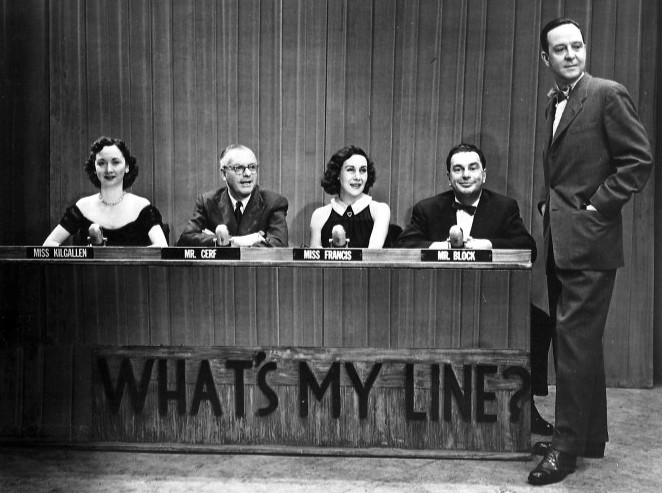In the 1950s, one of the most popular shows on television every Sunday asked the question: “What’s My Line?” A panel of celebrities would have to guess what someone did for a living by asking a series of simple yes-or-no questions. The show was a sensation. It ran from 1950 to 1967 on CBS—to this day, the longest-running primetime network television game show.
I thought of this show when I looked over today’s readings, because in many ways Luke challenges us to play a similar game of “What’s My Line?” with the woman at the center of this Sunday’s gospel.
Luke gives us all sorts of information about the Pharisee, Simon, and other people who were following Jesus; he sets the scene and provides compelling, credible details about what was going on.
Yet, when it comes to the woman Jesus forgives…we learn almost nothing.
We don’t know her name, her age, her background or even her sin that needed forgiving. Some speculate this was Mary Magdalene, or this woman was a prostitute – but we have nothing to prove that beyond what’s in this account.
All we know, really, is that she was a sinner, known to many, and in need of God’s mercy.
In that sense, she was like all of us.
So, to answer the question: “What’s My Line?,” well, in the case of this woman, we just don’t know.
What we do know is that something compelled her to follow Christ, to come to this Pharisee’s house, to kneel before the feet of Jesus, and to weep and anoint his feet. Something motivated her to perform this great act of love.
What was it?
Well, I think she looked at Jesus…and saw herself.
If you read what happened just before this episode, you can understand why.
Just before this dinner at the Pharisee’s house, Jesus had been told of the arrest of John the Baptist. And he wasted no time noting how others had judged John– and how they had judged him.
“For John the Baptist,” Jesus said, “came neither eating food nor drinking wine, and you said, ‘He is possessed by a demon.’ The Son of Man came eating and drinking and you said, ‘Look, he is a glutton and a drunkard, a friend of tax collectors and sinners.’”
Maybe one sinner in particular, that woman, heard that and it struck a chord. Maybe she understood that there was much more to Jesus than what he ate or who he befriended.
Maybe she realized: “They have it wrong. They’re judging him the way they judge me. He understands what it is like to be me.”
And maybe, drawn to his compassion, aware of her own sin and hungry to be forgiven, she followed him to the house of the Pharisee, and performed that act of tender mercy and love. And her sins were forgiven.
This story from Luke carries a message we need to hear: God doesn’t jump to conclusions. He doesn’t apply labels. He recognizes our failings, our sins, our shortcomings. But he also sees something more. He sees not just what we are, but what we can be.
We are more than the sum of our sins.
We are better than that. Who are, we after all?
We are the alcoholic determined to stay sober—and attending AA meetings five nights a week to make that happen.
We are the husband neglecting his family because of his job, or his ego, or his own selfishness, and deciding to rearrange his priorities so that he can attend his son’s little league game.
We are the woman who hasn’t been to confession in 20 years, quietly slipping into the pew on a Saturday morning, waiting for the chance to reconcile with the Church and finally, at long last, come home.
God sees not only what we are, but what we can be.
I think it’s telling that we never learn the name of the woman in this gospel. One commentator speculates that Luke did that to protect her dignity. She was somebody’s daughter, somebody’s sister, maybe someone’s wife and mother.
But I think he also did it to reflect a deeper truth: she could be any of us. And any of us could be her.
The Church opens her arms to us in the sacrament of reconciliation, confession, to give us the grace to become, truly, whom God wants us to become—sinners aspiring to become saints. If you haven’t been to confession lately, I urge you to give it a try, to feel in your heart the words that Jesus said to the woman in the gospel: “Your faith has saved you, go in peace.”
It is a peace that makes whatever burdens we carry lighter—and that makes the possibility of a new beginning more than just a possibility. As a priest once said to me, after I returned to confession after years of being away: “There you go. Good as new.”
By the grace of the sacrament, and the mercy of God, and the extravagance of his love…we are made “as good as new.”
The name of a TV quiz show can serve as a challenge to each of us. What’s my line? Well, the line I belong in —more often than I care to admit—is the confession line. I’m a sinner. But God wants me to become a saint.
That’s the answer for all of us.
Because — as we are reminded in today’s gospel — God sees not only what we are, but what we can be.

